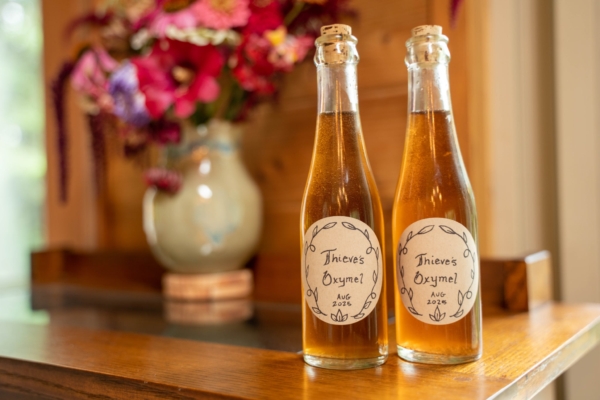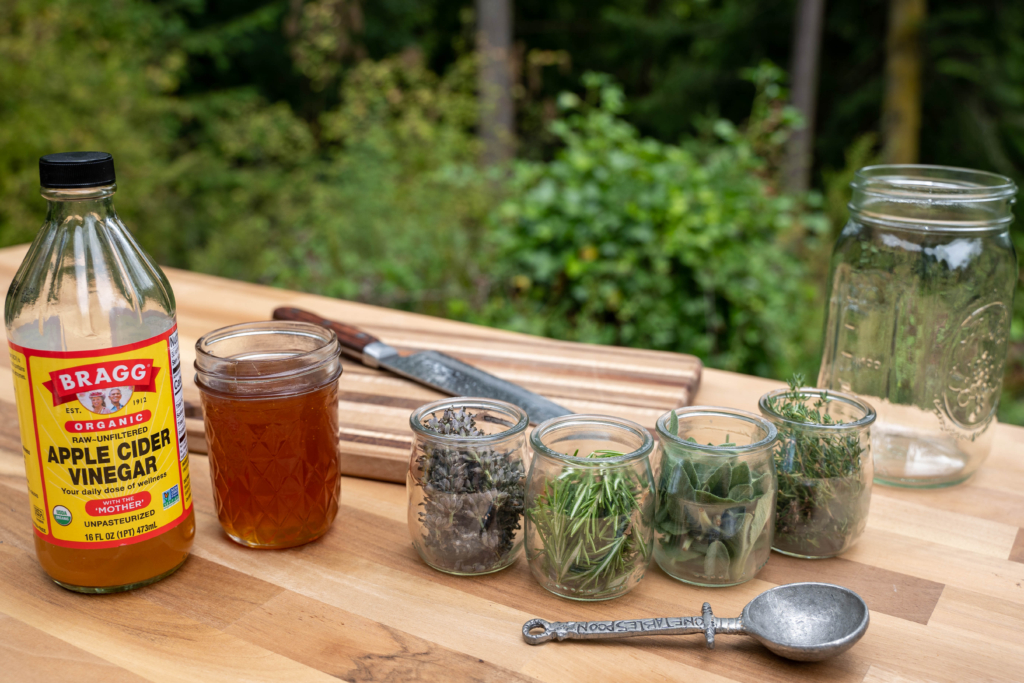
Honey and vinegar have been mixed together for thousands of years, creating what the ancient Greeks called an oxymel (from the Greek words for “acid” and “honey”). Add in a handful of aromatic herbs, and you get a simple herbal preparation that's both medicine and food – but most importantly, delicious. Oxymels have been used for centuries to support digestion, boost mood and immunity, soothe seasonal sniffles, and more.
The basic recipe couldn't be easier; you're essentially making an alcohol-free herbal tincture with a touch of honey. I try to keep a jar in my kitchen year-round. There's something satisfying about having a homemade natural remedy on hand for those moments when you need it most: you can sip it straight from the spoon on a cold winter morning, swirl it into tea or sparkling water for an instant botanical boost, or drizzle it over food for zingy aromatic flavor.
According to ancient folklore, the Four Thieves blend is one of the most famous oxymel recipes, used by grave robbers during plague times to avoid getting sick. In this article, we’ll dive into the world of aromatic herbal oxymels and explore their diverse benefits, from supporting immunity and digestion to elevating culinary dishes and even soothing stress. We’ll also share our favorite aromatic herbs to infuse into oxymels, plus the story of the Four Thieves and our cherished step-by-step oxymel recipe for this classic formula.
What is an Oxymel?
At its heart, an oxymel is a sweetly simple formula: vinegar, honey, and herbs. Traditionally, apple cider vinegar (ACV) is the go-to base, prized for its ability to extract minerals and beneficial compounds from plants, while raw honey lends sweetness, soothing properties, and its own nutritional and antimicrobial benefits. ACV is thought to offer therapeutic benefits of its own, including amino acids and antioxidants that help support overall health. When you add aromatic herbs to the mix, an oxymel comes alive. The vinegar extracts the plants’ medicinal constituents and some volatile oils, while the honey locks in their fragrance and flavor.
One of my herbal teachers often said, “The best herbal medicine is the one you’ll actually take.” He was usually talking about alcohol-based tinctures, which are powerful but not always pleasant, with their fiery burn and sometimes intensely bitter taste. Oxymels, on the other hand, are gentle on the palate and irresistibly delicious. The bright tang of vinegar balanced by the sweetness of honey makes them a joy to use, which means I find myself reaching for that jar far more often, and reaping the oxymel benefits more consistently.
Oxymel recipes also have deep roots throughout traditional medicine history and can be found in the medical writings of Hippocrates, as well as in Persian and medieval European texts. For centuries, they’ve been used to ease coughs, soothe sore throats, aid digestion, strengthen immunity (especially during the colder months), and boost vitality.
Herbalists have long loved oxymels for another reason, too: they preserve the essence of plants beautifully, keeping their potency and flavor long after fresh herbs are out of season. On top of that, vinegar especially excels at extracting vitamins and minerals from herbs – something that alcoholic tinctures are not very good at. This comes in handy for mineral-rich herbs like Rosehips and Pine needles, both high in Vitamin C.
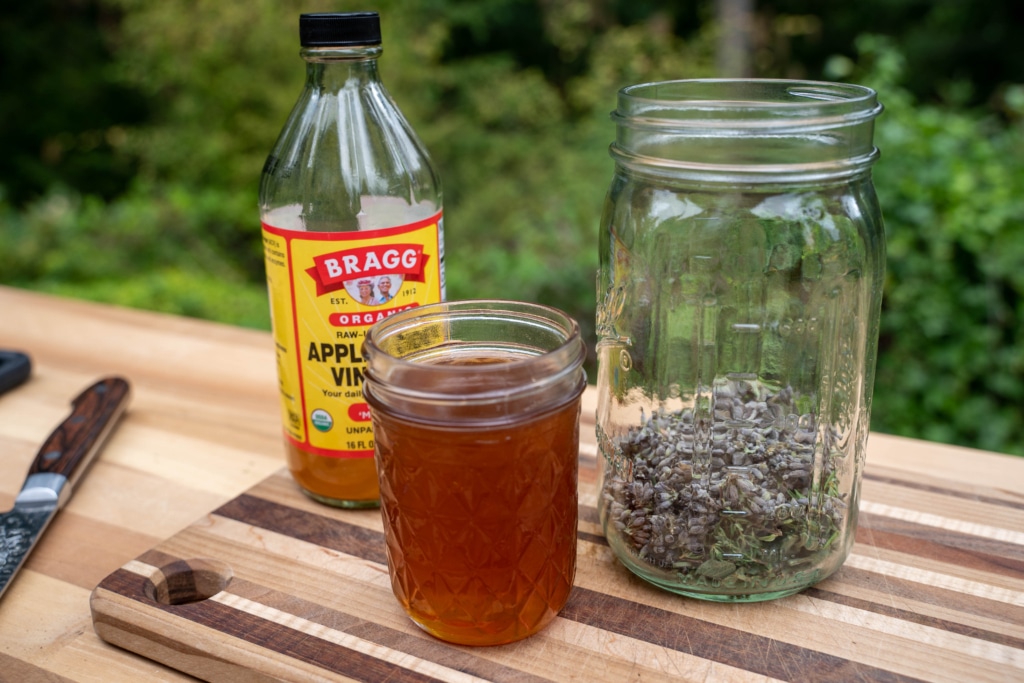
Oxymel Benefits
Beyond delighting the senses, the health benefits of oxymels are vast and vary depending on the herbs used in your formula. Both raw apple cider vinegar (ACV) and raw honey have been used for centuries as potent natural remedies, both rich in antioxidants, vitamins, and minerals. Honey soothes and coats the throat and offers antimicrobial protection, while ACV helps boost immunity with high Vitamin C content, as well as probiotics that support gut health.
When you combine these two powerful remedies with aromatic herbs, you create a remedy that engages the senses while delivering deep, plant-based nourishment:
Oxymel Benefits + Herbs for Immunity
ACV draws mineral-rich compounds from herbs, honey strengthens immunity and soothes the throat, and certain aromatic plants can help fortify your body’s defenses. Try Thyme, Oregano, Sage, or Rosemary, known for their antimicrobial and immune-strengthening qualities.
Oxymel Benefits + Herbs for Digestion
ACV can help stimulate appetite, encourage healthy gut flora, and gently support digestion. Aromatic herbs like Ginger, Mint, Fennel seed, and Basil can add both flavor and digestive support.
Oxymel Benefits + Herbs for the Respiratory System
Many aromatic herbs are known for opening the airways, easing congestion, and supporting clear breathing. Thyme, Rosemary, Hyssop, and Sage are popular aromatic herbs for respiratory wellness.
Oxymel Benefits + Herbs for the Nervous System
The bright scents and flavors of aromatic herbs combined with vinegar and honey can help uplift the spirit and refresh the mind. Plus, many aromatic plants are known as nervines, herbs that help soothe stress and naturally bring balance to the emotional realm. Reach for Lemon balm, Lavender, Chamomile, Tulsi, or Rose to bring a gentle, joyful boost to your oxymel recipe.
Bonus Oxymel Benefit: Not only are oxymels powerful natural medicines, they’re also delicious and easy to use in the kitchen. Try drizzling them over roasted vegetables, whisking them into salad dressings, adding them to marinades, splashing them into oatmeal or smoothies, or stirring a spoonful into sparkling water, tea, or your favorite drink for a refreshing boost.
Unlock Your Free Issue Of...
🌿 The Aromatic Medicine Garden Membership 🌿
Are you ready for a deeper, holistic dive into the world of aromatic plants? See what our membership is all about with your free sneak peek issue, including an hour-long plant talk and a 21-page plant profile pdf full of recipes and insights.

How to Make an Aromatic Herbal Oxymel: The Four Thieves
Now comes the fun part – crafting your very own aromatic herbal oxymel! Choose plants that call to you or select herbs with a specific purpose in mind, whether for flavor, therapeutic benefits, or culinary use. The herbs you pick will shape both the taste and the function of your oxymel. You can use fresh or dried herbs: fresh herbs bring bright, vibrant flavors and higher aromatic oils (though they may add extra moisture and slightly shorten shelf life), while dried herbs are convenient, store well, and often offer a more concentrated flavor.
Traditional oxymel recipes vary in their honey-to-vinegar ratios, but most modern versions use a 1:1 ratio, giving equal parts honey and vinegar. The beauty of making your own herbal remedies is that you get to decide exactly how it comes together. Experiment, play with proportions, and trust your senses to guide you! I try keeping notes of my creations so that I can go back and recreate something I loved, or edit something that didn't turn out exactly how I wanted.
The Story of the Four Thieves
According to ancient folklore, the legend of the Four Thieves came about from a group of burglars who used this recipe to protect themselves from getting the bubonic plague in Europe while robbing graves and the homes of the sick. Despite their exposure to the disease, the thieves remained healthy, leading many to wonder about the vinegar's protective properties.
After the thieves were caught, they were guaranteed freedom without punishment if they shared their secret recipe, which is now known as Four Thieves Vinegar. The exact recipe varies, but it typically consists of vinegar infused with aromatic plants, including Rosemary, Sage, Thyme, Lavender, and sometimes other herbs known for their antimicrobial properties, like Garlic and Clove. Four Thieves Vinegar is commonly used as a delicious tonic to boost immunity and support mental clarity, digestion, and stress relief.
Four Thieves Oxymel Recipe
Ingredients:
3 TBSP Lavender flowers
3 TBSP Garden Sage leaves
3 TBSP Rosemary needles
3 TBSP Thyme leaves
1.5 cups organic apple cider vinegar
1.5 cups raw honey
Tools:
Knife
Cutting board
Measuring cups & spoons
Clean 32-oz glass mason jar with a lid
Fine mesh stainless steel strainer and/or cheesecloth or muslin cloth
Wax paper
Label & pen
Instructions:
1. Chop up your plant material using a knife and a cutting board to maximize the extraction potential.
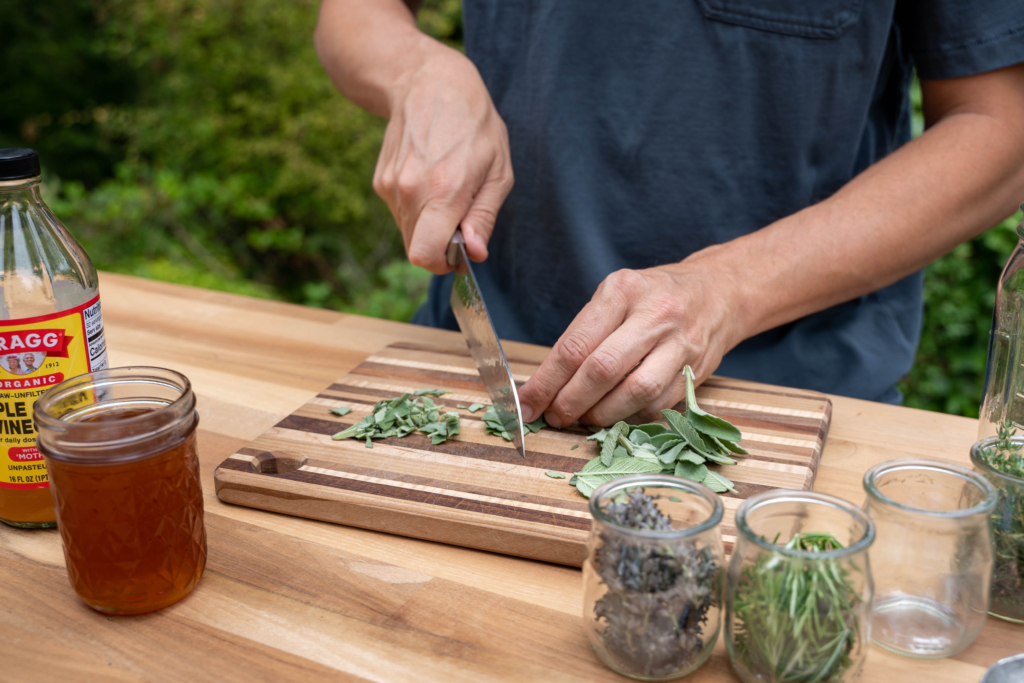
2. Add your plant material to the 32-oz glass mason jar.
3. Measure and add your apple cider vinegar and honey to the glass mason jar, thoroughly mixing it and making sure to completely cover the herbs with menstruum.
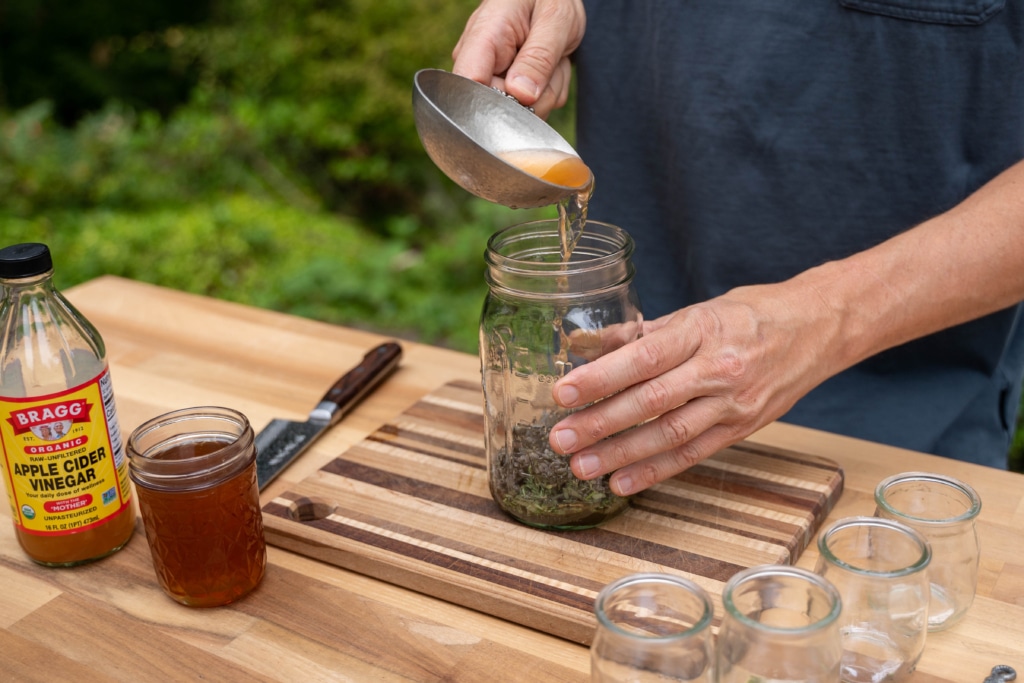
4. Metal and vinegar can create rust, so be sure to put a bit of wax paper in between the metal lid and glass jar to separate the vinegar extract from the lid during maceration.
5. Label your jar with the ingredients and date.
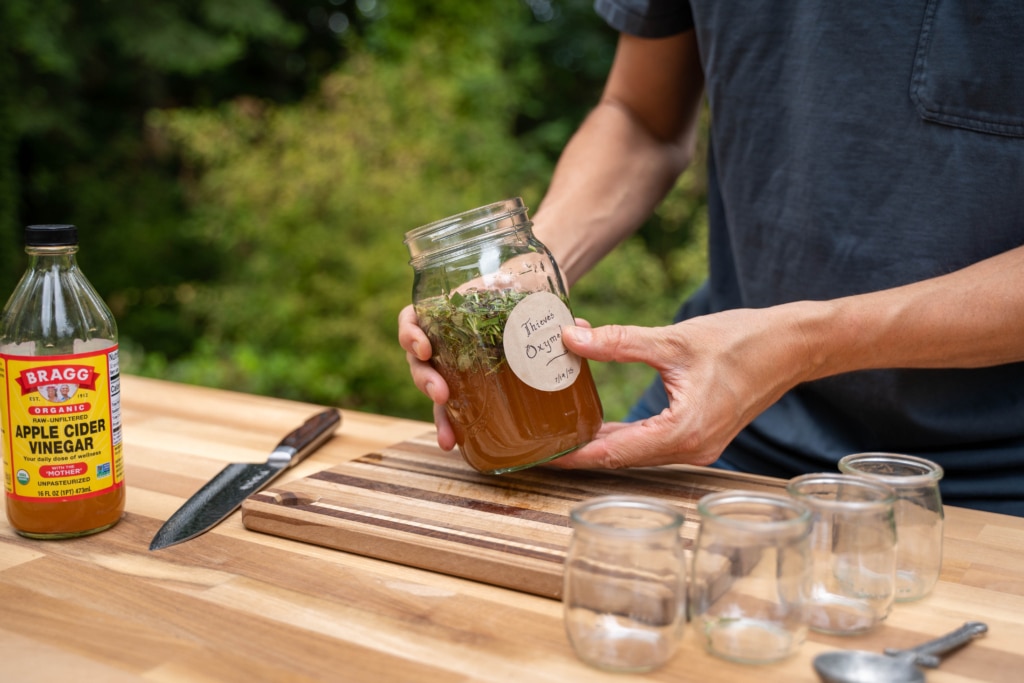
6. Set the lidded glass jar in a cool, dark place and return every day to gently stir the mixture and check on menstruum levels. If the herbs are no longer completely covered with liquid, you may add a little more vinegar/honey mix to top it off. You always want the herbs to remain covered with menstruum to avoid spoilage!
7. Allow your oxymel to infuse for 2 weeks, then strain out the herbs using a fine mesh strainer and/or cheesecloth or a muslin cloth. I like to use both to finely strain it.
8. Be sure to label your storage bottle! You can store your herbal oxymel in the refrigerator to maximize shelf life. It should last about 3-6 months with fresh plant material and up to 12 months with dried herbs.
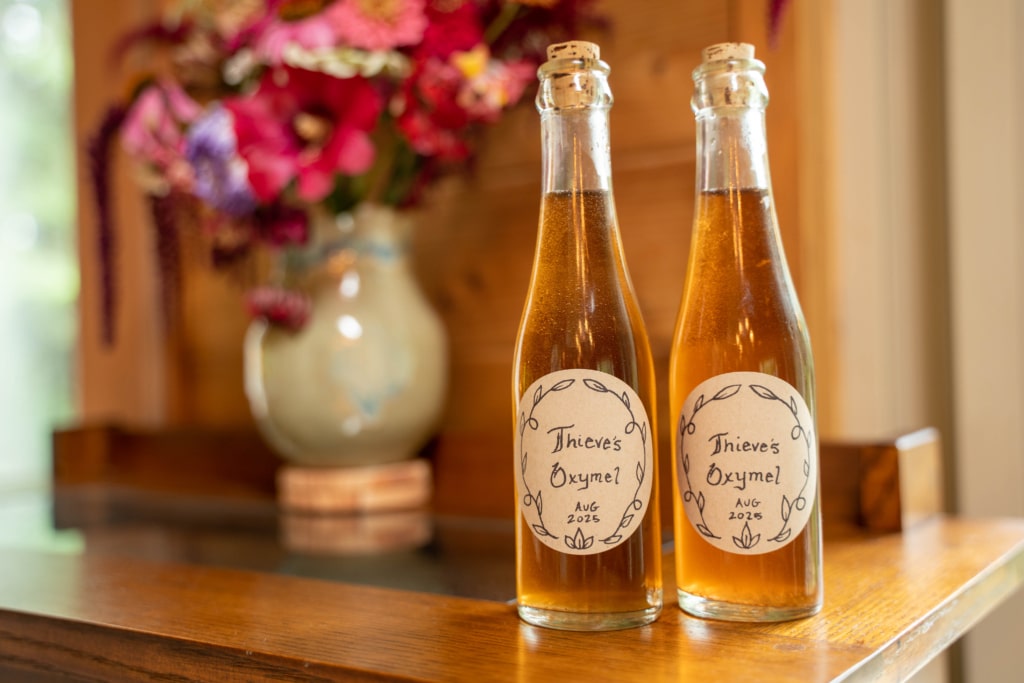
How to Use Your Oxymel
Four Thieves oxymel is a flavorful, versatile tonic that can support immune health, sharpen mental clarity, ease digestion, and promote relaxation. Enjoy a spoonful straight for a quick pick-me-up, or dilute it in water for a gentler taste. It’s delicious stirred into warm water or tea for a soothing daily ritual, mixed with sparkling water for a bright, refreshing drink, or whisked into vinaigrettes and marinades to bring herbal flavor to your meals.
Safety Notes: Try to use raw, unpasteurized honey to maximize the health benefits. Never give raw honey to children under 1 year old. Make sure you research your herbs and use only those safe for consumption, taking care to understand any potential contraindications such as pregnancy, breastfeeding, prescription medications, allergies, or other health sensitivities.
Oxymel Inspirations & Variations
Oxymel recipes are endlessly adaptable, inviting you to tailor both flavor and function to the season or your needs. Some of my favorite oxymel recipes to make include a Fire Cider oxymel for a potent immune boost in the fall or winter, and light floral oxymels to add to sparkling water for summer (think Rose & Chamomile or Lemon Balm & Mint)! Warming spices like Cinnamon and Cloves can add depth and seasonal character for the holidays, and a Pine needle oxymel makes the perfect soothing cough syrup.
You can also fine-tune the vinegar-to-honey ratio or adjust the herb-to-menstruum proportion to create a balance that perfectly suits your taste and desired potency. Let your creativity guide you: choose herbs, flavors, and aromas that call to you, and craft an oxymel that makes your senses sing and is uniquely your own. (Click here for our go-to Fire Cider recipe.)

This oxymel recipe is an excerpt from our Aromatic Medicine Garden library. In this immersive online membership, you’ll unlock our entire medicine cabinet and find:
🌿 Extensive Plant Talk video lessons
🌿 Beautifully detailed plant profiles
🌿 Step-by-step herbal preparation tutorials
🌿 Foundational teachings in aromatic plant science & folklore
🌿 Expert cultivation and wild-harvesting tips
🌿 Plant recipes, rituals, and so much more
Whether you're just starting your journey or deepening your plant wisdom, the Aromatic Medicine Garden is your portal to empowered, holistic health. Click here to learn more & join the waitlist so you'll be the first to know when the doors open next.
Article Written By Melissa Szaro

© 2025 The Northwest School of Aromatic Medicine. All rights reserved.
*The statements above have not been evaluated by the FDA, and are for educational purposes only. This article is not intended to diagnose, treat, cure, or prevent any disease. This article should not be taken as medical advice. Please consult your physician before you use this information for health purposes.
